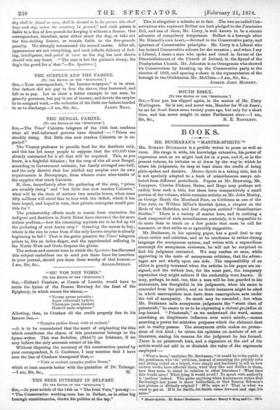"SIC VOS NON VOBIS."
[TO THE EDTTOR OF THE "SPECTATOR.")
SIR,—Richard Crashaw, as Canon of Loretto, would have to recite the hymn of the Roman Breviary for the feast of the Epiphany, in which occurs the stanza,-
" Novum genus potentix : Aquae rubescunt hydrim, Vinnmque jussa fundere Mutavit unda originem."
Allowing, then, to Crasbaw all the credit properly due to his famous line,— " Nymphs pudica Bourn vidit et erubuit," —it is to be remembered that the merit of originating the idea which constitutes the charm of this pentameter belongs to the hymn-writer. This was Sedulius, (Shiel ?) an Irishman, if we may believe the only accounts extant of his life.
Without disputing the accuracy of the construction quoted by your correspondent, S. G. Cochrane, I may mention that I have seen the line of Crashaw transposed thus,- " Vidit et erubuit nympha pudica Boum," which at least accords better with the quotation of Dr. Talmage.


































 Previous page
Previous page